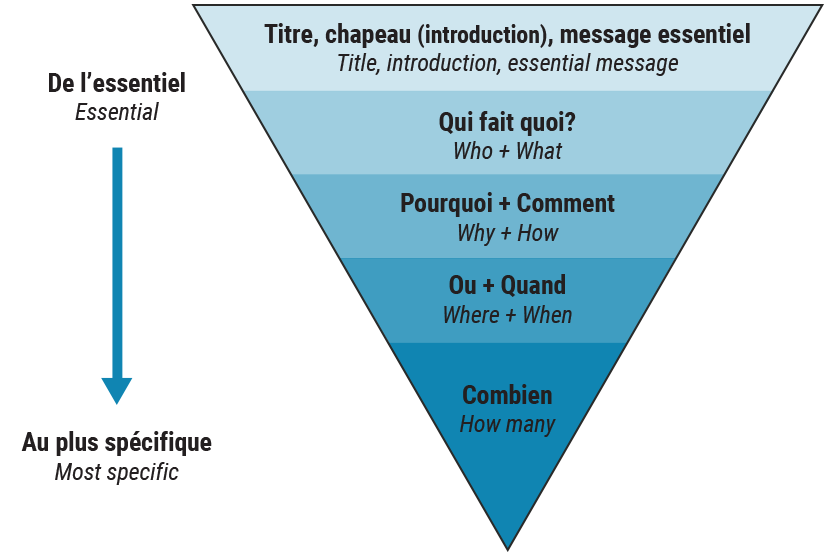
By Mélissa Toutant, marketing coordinator
Why should I write the texts of my website? Or better yet, why have them written by a specialist? You know that your company is in need of a website, but when it comes down to the writing, you’re not too sure about its necessity – or you’re not sure what it is for. Do not worry! This is one of the most frequently asked questions in the world of the web.
Writing happens to be one of the most neglected steps when the time comes to construct a website, while it should actually be considered crucial. A powerful site required a variety of elements, including an inviting and adaptive design, simple structured navigation and texts that are optimized.
The content of your website should primarily meet the needs and expectations of its visitors, because otherwise they will leave it quickly. Your website is a form of communication that will help you achieve your marketing and sales goals. Without clear and consistent content, your site loses the very essence of its strength.
In this article, you will learn why writing texts on your website are important and especially how to do it.
The content present on your pages serves to naturally reference your website in the search engines so that the web surfers will find you. SEO techniques and keywords are essential for your business to be spotted.
On the other hand, when they are on your site, they must quickly grasp that their needs are met. The texts must be original, not contain redundancies, be written without errors and, above all, meet specific objectives. Their goals: to inform and convince.
Writing for the web is not like writing for other forms of media. Users consume content on the internet in a completely different way. It is therefore important to properly understand the nuances to be able to write captivating texts. There are two steps to be taken before beginning your writing.
Your site must meet pre-established business objectives. Is it to improve your notoriety? Increase your sales? Tell a friend about this product? Whatever your goal is, your site must be there to help you reach it. Why do you need to write these pages? Each one must have a specific purpose. We do not write to simply fill space.
The persona is a semi-fictions representation of your typically client constructed with actual data. With demographic indications, psychological characteristics and behavioral information, you know exactly who they are, what job they do, what education they have done and so on.
Why learn about all of this? The information gathered will allow you to determine what they consume on the Web. By having the maximum data on your potential customer, you will be able to sell them your products and services.
It’s for them that you’re writing. You’re hereby assuring that the content of your pages corresponds to what they’re looking for.
The content serves to meet the needs of internet users. It is the solution to a problem that targets your potential clients. If the content is able to make them understand, they will have no choice but to contact you to do business with you.
Avoid at all costs advertising and self-promotional messages. Internet users do not want to know if you are good; They want to know if you can help them – They will realize for themselves your excellence in the market!
A sales text will demonstrate how your product or service can satisfy the customer. Give concrete details of how your company will make life easier for them and give them results. Credible and relevant information will enable them to see that you are the right choice.
When you begin writing, think about the message you want to convey to your persona. Speak directly to them. Your content must be personalized to your visitors in order to retain them.
Internet users only spend a few seconds on an internet page. They usually scan the page by skimming through the content. It’s therefore important to get their attention very quickly and keep them interested in learning more. Otherwise, they will continue their research on other sites.
Key information should be placed at the beginning of the paragraphs and in the headings. The user must be able to find answers to their questions instantly. This way of writing is as good for SEO as it is useful to guide.
The 5 W’s and 2 H’s are the questions that will help you to guide your writing in the right direction.
This is the primary information that people will look for. If your content answers all these questions – and more – you are on the right track!
Here is the inverted pyramid with the order importance of questions to be answered.

You must bring the user to a precise location. What do you want them to do after they have been on the home page? After they have read a page on your services? Take them by the hand and lead them exactly to the action you want them to take.
To do this, you must prompt them to click on a link by a call-to-action, that will bring them to an order or to the contact page. For example, “contact us to make an appointment”. A formulation with a verb to action drives the readers to know precisely what to do if they are interested in your business. Otherwise, you risk losing it for a competitor.
Your writing style must be precise, clear and punchy. Forget the jargon on the Web. You must assume that readers will not necessarily know your domain. The vocabulary used should be simple and comprehensive.
In addition, many are attracted only by the titles. They should be short (between 4 and 10 words), catchy and informative.
The optimization of your texts with SEO (Search Engine Optimization) will serve to improve your natural reference, an essential variant to position your site in the first search results.
Your company must then position itself on keywords relevant to your sector of activity. When users enter them in the search bar of a browser, your site will be able to stand out. This is mainly the primary function, although several other indicators are taken into account.
Note that a page must correspond to a theme, therefore to a type of keyword and its variants. Remember that quality content takes priority over the amount of keywords. Google will even punish you for abusing the use of keywords in your texts. They are to be used sparingly and strategically.
How to optimize your texts?
There is nothing more disturbing than seeing a variety of spelling, grammar and syntax errors in a text. You could quickly lose the attention of your reader on the essential message. Then, it would make you look less professional.
People buy more than just a brand; they also buy the values it carries. By reading your website, your customers want to see your personality. If you trust them, they will offer you the same in return. Web writing is therefore a set of techniques that maximize the effectiveness of a Website – and the effectiveness of marketing a business! Visibility is only improved, and you will generate even more traffic.
Are you ready to write? If it’s not in your specialties, be aware that professional web writers are there to accompany you or do it for you. At Adeo Internet Marketing, our content marketing specialists can create eye-catching texts that meet your goals. Contact us now to start your project!
Start the content of your website by downloading all the steps that will guide you in writing successful pages.